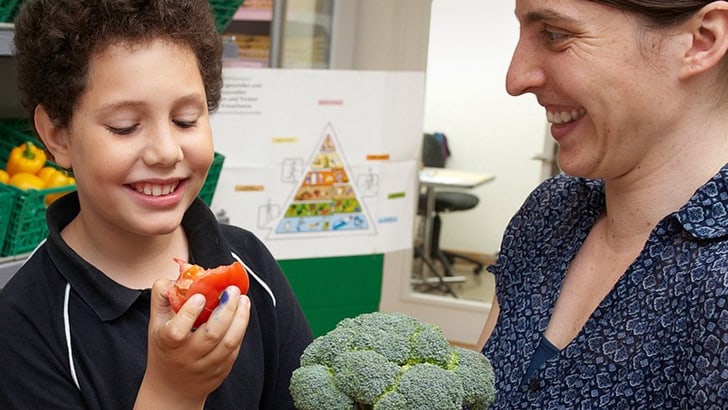"A balanced diet must also be possible on a tight budget."
Interview with Michael Sahli, President of the SV Foundation Board, about new food trends, poverty and the greatest strength of the Caritas market.
Mr. Sahli, the SV Foundation was founded in 1914, when food was scarce and a healthy diet was the preserve of the few. How healthy is Switzerland's diet today?
A difficult question to begin with! (laughs) The diet has become more varied. Foods such as lentils and other pulses are back on the table, as are newer crops such as sweet potatoes, and more and more people are eating a vegetarian or vegan diet. According to the national study "menuCH", the consumption of sweets and meat is still higher than recommended by science.
Has the focus of the applications your foundation receives also changed?
We are receiving more applications for support for Food Waste and Food Save. Caritas markets are also involved in this area. This shows that people are taking a broader view of nutrition these days - they are not just looking at what goes on their plates, but are also interested in what happens before and after.
A sign that the topic of sustainability is gaining in importance?
If sustainability also means that food is used to nourish people and not to feed the dustbin, absolutely! A good example is the Food Save Banquets, which we support. What began in 2016 with one event in Bern has now grown to 18 banquets in German- and French-speaking Switzerland. This is not a matter of course. Local committees are needed for every event, so the idea and sponsorship must come from the local population. This is confirmation of the fact that sustainability is on the minds of many
.
The SV Foundation has been committed to a balanced diet for the general public for over 100 years."
Michael Sahli
Chairman of the SV Board of Trustees
Food is becoming more expensive due to inflation. Has this already had an impact on eating habits?
We don't keep any statistics on this. We can see, for example, that food vouchers are in very high demand at the Bon Lieu project. This shows that inflation is hitting people with limited financial resources very hard. As far as I know, customers in the Caritas market often turn to energy-dense foods when prices rise. Due to their sugar and fat content, these tend to be unfavorable for a balanced diet. The rise in prices therefore has a direct impact on the consumer behavior of many people.
How is the SV Foundation dealing with this?
We are taking this development seriously. It should not be the case that people can no longer afford to go shopping. A balanced diet must also be possible on a tight budget.
You mention the SV Foundation's vision: "Healthy nutrition for all". How close or far away are we from this?
Current developments show that our vision is more relevant than ever. We could support many more projects than our financial resources allow. This is confirmation that we are still needed. Unfortunately, our foundation goal will probably not be reached any time soon.
How can we succeed in providing people on a tight budget with a healthy yet affordable diet?
This requires a variety of projects and reliable partners, some of whom implement their projects on a large scale. This is one of the strengths of Caritas markets. The stores are not just limited to one region, but are established wherever there are social hotspots and the need is great. This is why we have been supporting the markets for almost ten years as part of our project partnership by reducing the price of the fruit and vegetable range.
What food trends do you see in the future?
Unfortunately, I don't have a crystal ball (smiles). There are global factors that influence our diet, such as world events. The war in Ukraine shows that grain can suddenly become scarce and expensive. Climate change also has a direct influence. There will be massive changes in what we can grow. At the same time, we are dependent on an alarmingly small number of seed varieties. This potentially leads to susceptibility to diseases or extreme weather phenomena.
And what makes you feel positive?
People's creativity and adaptability are key when it comes to nutrition. For many, animal welfare and/or the climate are important, so they are increasingly eating a plant-based diet. In certain sectors of the economy, topics such as a balanced diet or sustainability are being taken up. The SV Group has been pursuing a sustainability strategy for some time now. Companies with such strategies achieve a significant impact. In addition, science is producing new findings that will have a positive impact on our diet. This includes the fact that more knowledge will be available to the general public. Today, every product already states what ingredients it contains and whether it is gluten-free and/or vegan. This is a benefit for society as a whole.
Source: This interview was conducted for the 2023 annual report of the Caritas Market Switzerland cooperative.
